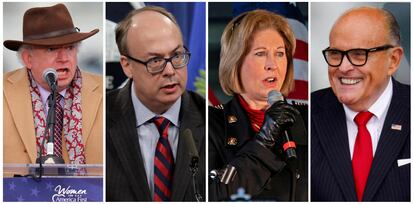Prosecutors may be aiming for quick Trump trial by not naming alleged conspirators, experts say
More defendants mean more defense lawyers, and more legal motions and more delays, according to legal scholars and former prosecutors

By not naming or charging six alleged co-conspirators in the indictment this week of former President Donald Trump, federal prosecutors may be signaling their desire to expeditiously put the Republican presidential front-runner on trial for seeking to overturn the 2020 election.
More defendants mean more defense lawyers, and more legal motions and more delays, according to legal scholars and former prosecutors. Such a large cast of defendants would make it extremely difficult for Justice Department special counsel Jack Smith to get Trump in front of a jury before the final stretch in the 2024 campaign, the experts said.
“This keeps it pretty streamlined,” said Christopher Ott, a former federal prosecutor. “All of those motions by defendants affect all of the defendants, including Trump. It would slow things down. If you don’t name and charge them, you don’t have that trouble.”
Trump, 77, was indicted by a federal grand jury in Washington on Tuesday on felony charges of seeking to illegally overturn the results of the 2020 election and block the peaceful transfer of power to President Joe Biden.
The four-count indictment chronicles a months-long campaign by Trump and six unnamed co-conspirators to spread lies about the election results — falsehoods that resulted in a violent insurrection at the U.S. Capitol.
It includes charges of conspiring to defraud the U.S., conspiring to obstruct an official proceeding and obstructing an official proceeding. It also alleges Trump violated an 1800s law that makes it a crime to conspire to violate rights guaranteed by the Constitution — in this case, the right to vote.
It is the third time this year that Trump has been charged with a criminal offense. He was indicted by a federal grand jury in Miami on charges of illegally retaining top secret documents. In New York, Trump faces criminal charges in a hush money case and a civil trial over his business practices.
He could face further charges in Georgia, where a county district attorney is investigating efforts by Trump and his allies to overturn his 2020 election loss in the state.
The indictment Tuesday alleges that Trump was aided in his efforts to overturn the election by six unnamed co-conspirators. The Associated Press has identified five of them through court and Congressional records and other means:
— “Co-Conspirator 1″ and “Co-Conspirator 2″ are lawyers Rudy Giuliani and John Eastman. Giuliani, one of Trump’s attorneys, is described in the indictment as “an attorney who was willing to spread knowingly false claims” about the election. Eastman “advised and attempted to implement a strategy,” the indictment said, that would have seen former Vice President Mike Pence reject the certification of the electoral vote.
— “Co-Conspirator 3,” attorney Sidney Powell, pushed election conspiracies that even Trump privately conceded sounded “crazy,” the indictment alleged.
— “Co-Conspirator 4″ is Jeffrey Clark, a Justice Department official who championed Trump’s false claims of election fraud.
— “Co-Conspirator 5″ is lawyer Kenneth Chesebro, whom the indictment alleges “assisted in devising and attempting to implement a plan to submit fraudulent slates of presidential electors to obstruct the certification proceeding.”
— “Co-Conspirator 6″ is an unknown political consultant who also assisted with the fake electors plan.
In deciding not to charge those six individuals, legal scholars said, Smith and his prosecutors were not just thinking about how to move quickly before the 2024 election. They may also be feeling pressure to win a conviction before Trump or another Republican might capture the presidency and order a stop to the prosecution.
Smith may have been trying to find ways to simplify the unprecedented trial of a former president accused in the indictment of assaulting the “bedrock function of the United States federal government: the nation’s process of collecting, counting, and certifying the results of the presidential election.”
“Four counts, one defendant, that’s it,” said Jimmy Gurulé, a law professor at Notre Dame.
Not indicting the alleged conspirators doesn’t mean they won’t face charges. Legal scholars, in fact, said they believed the alleged conspirators stand a strong chance of being indicted and going on trial, perhaps after Trump faces a jury.
“It doesn’t mean they are off the hook,” said Randall Eliason, a former federal prosecutor who is a George Washington University law professor. “It’s just a question of timing and tactics. ... The prosecution is very clearly saying, ‘I’ve got you in my sights.’”
Sign up for our weekly newsletter to get more English-language news coverage from EL PAÍS USA Edition
Tu suscripción se está usando en otro dispositivo
¿Quieres añadir otro usuario a tu suscripción?
Si continúas leyendo en este dispositivo, no se podrá leer en el otro.
FlechaTu suscripción se está usando en otro dispositivo y solo puedes acceder a EL PAÍS desde un dispositivo a la vez.
Si quieres compartir tu cuenta, cambia tu suscripción a la modalidad Premium, así podrás añadir otro usuario. Cada uno accederá con su propia cuenta de email, lo que os permitirá personalizar vuestra experiencia en EL PAÍS.
¿Tienes una suscripción de empresa? Accede aquí para contratar más cuentas.
En el caso de no saber quién está usando tu cuenta, te recomendamos cambiar tu contraseña aquí.
Si decides continuar compartiendo tu cuenta, este mensaje se mostrará en tu dispositivo y en el de la otra persona que está usando tu cuenta de forma indefinida, afectando a tu experiencia de lectura. Puedes consultar aquí los términos y condiciones de la suscripción digital.








































